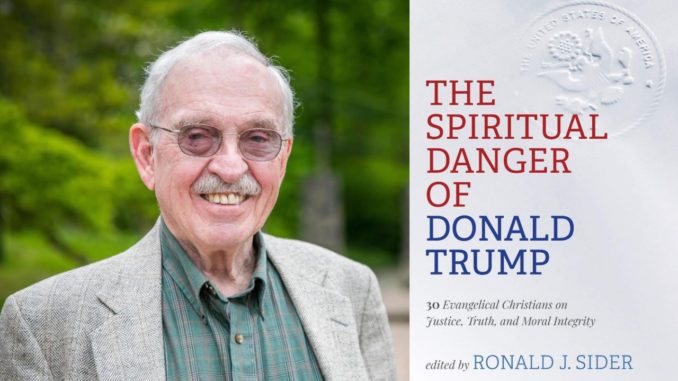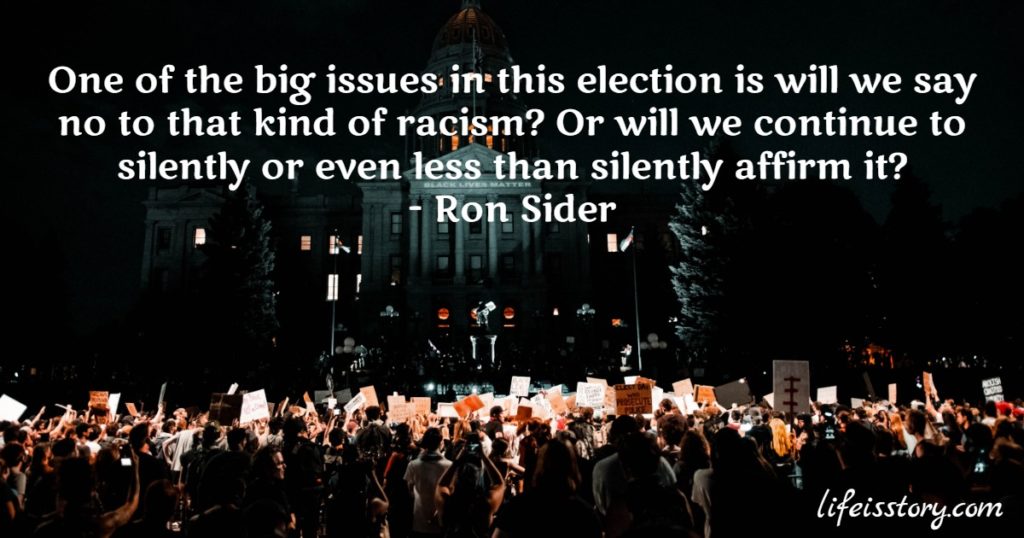
Podcast (beyond-the-page): Play in new window | Download
Subscribe: Apple Podcasts | RSS
Over the last four years, I—an evangelical pastor—have felt less and less connected to my church tradition because my church tradition suddenly became more and more about Donald Trump. I have felt alone. Very alone. But as it turns out, I’m not.
Over the last four years, I’ve lost my faith. Not in Jesus, mind you, but in those who claim to be his people. Those who claimed to be my people. Both those whom I looked up to as mentors and those whom I shepherded in my congregation. I simply could not—and cannot—understand what has led evangelical Christians to not just begrudgingly support but actually commend a man whose policies and personality are, frankly, anti-Christ.
Ron Sider and his team of writers restored some of my faith to me. Dr. Sider has long been a major influence in my life. His seminal work, Rich Christians in an Age of Hunger is an annual re-read to help reorient my personal economic ethic. If Jesus is Lord reaffirmed my commitment to non-violence. The Spiritual Danger of Donald Trump reminded me that I, as an evangelical, am not alone in my concern that the evangelical church has found for themselves a golden calf. It was highlight of my podcasting career to get to speak with Dr. Sider.
The Interview | The Spiritual Danger of Donald Trump, ed. Ron Sider
Josh Olds: What were your feelings going into the 2016 election?
Ron Sider: I assumed along with many, many people that someone who was thrice married, boasted publicly of sexual affairs when he was married, you know, on and on, and had no experience in politics would be nominated. You know, being President of the United States is an enormously important position. It affects the lives of billions of people around the world. And so I just assumed that there was no way that the republican party would nominate him.
Josh Olds: Why do you think that evangelicals, white evangelicals, in particular, just really gravitated toward Trump?
Ron Sider: My sense is that there were a whole bunch of reasons. I think that, for some, the issue of abortion, if you’ll pardon the phrase, trumps every other issue, and he said he would be conservative on abortion and appoint people to the Supreme Court that would overturn it…I think that’s one issue. Another issue is that there are a large number of white evangelicals who are lower middle class, working class people. And the economy has not been fair to them. In the last 20 or 30 years, you know, their income has not really gone up…I think the issue of religious freedom was also an issue. You know, can faith-based organizations continue to hire on the basis of their beliefs? Last, I think I hate to say this, but I think in fact, there have been studies that clearly show this, that racism was one significant part. I mean, there’s no question but that Donald Trump successfully appealed to white racists. He didn’t reject the support of the former KKK head and in a whole bunch of ways, you know, made subtle appeals to them. So it was it was all of those things and probably more than that.

Josh Olds: I think there was a big sense of a loss of power. And I think white evangelicals in particular, have a perception that there was a loss of power during the Obama administration, and there was a desperate need to try to reclaim that power. But now moving into 2020, do you think that backing has shifted?
Ron Sider: So, one has to be more precise on any number of issues, but, you know, now in 2020, we know what Donald Trump has done. One of the most tragic things is, you know, with the murder of George Floyd in Minneapolis….We’re getting a massive outpouring, large numbers of white Americans are joining to say, you know, racism is wrong, and we have to stand against them. And as President, normally you’ll lead the nation in uniting us and what Donald Trump has done is continued to appeal to racism and continued to divide the nation. I mean, that’s a tragic failure on a terribly important issue.
I think white evangelicals are facing what I call our hour of decision with regard to racism. Evangelicals were a part of defending slavery. And then they were part of the people who did thousands of lynchings over the next hundred years after the ending of slavery. And when Dr. Martin Luther King marched and changed American society, white evangelicals largely opposed him. So white evangelicals really face a crucial hour of decision. And I think one of the big issues in this election is will we say no to that kind of racism? Or will we continue to silently or even less than silently affirm it?
Josh Olds: Can we come back from this? Have we given up our prophetic voice?
Ron Sider: Only God knows. I don’t know. I think that the the damage has been massive. I, you know, I’m still glad to call myself an evangelical. I believe in historic Christianity, the Trinity and the deity of Christ. The bodily resurrection of Jesus is the way to salvation. That’s central to who I am. And I am going to continue to understand that and say, That’s who I am. But just large numbers of younger people say that word “evangelical” doesn’t mean what you just said, Ron. It means right wing politics. It means pro-Trump politics, with its package of racism and lack of concern for creation care and lack of concern to the poor and so on. And that’s not who I am. So I think the damage is is not just temporary. I think it will last for a generation. A number of people are deciding that they need to have a different word to describe who they are.
The Book | The Spiritual Danger of Donald Trump
 What should Christians think about Donald Trump? His policies, his style, his personal life? Thirty evangelical Christians wrestle with these tough questions. They are Republicans, Democrats, and Independents. They don’t all agree, but they seek to let Christ be the Lord of their political views. They seek to apply biblical standards to difficult debates about our current political situation.
What should Christians think about Donald Trump? His policies, his style, his personal life? Thirty evangelical Christians wrestle with these tough questions. They are Republicans, Democrats, and Independents. They don’t all agree, but they seek to let Christ be the Lord of their political views. They seek to apply biblical standards to difficult debates about our current political situation.
Vast numbers of white evangelicals enthusiastically support Donald Trump. Do biblical standards on truth, justice, life, freedom, and personal integrity warrant or challenge that support? How does that support of President Trump affect the image of Christianity in the larger culture? Around the world? Many younger evangelicals today are rejecting evangelical Christianity, even Christianity itself. To what extent is that because of widespread evangelical support for Donald Trump? Don’t read this book to find support for your views. Read it to be challenged–with facts, reason, and biblical principles.
The Editor | Ron Sider
 Ronald J. Sider, whose book Rich Christians in an Age of Hunger has been called one of the top 100 books in religion in the twentieth century, is a well-known evangelical speaker, writer, and editor. Holding a PhD in history from Yale University, Ron Sider is president of Evangelicals for Social Action, director of the Sider Center on Ministry and Public Policy, and a professor at Palmer Theological Seminary. He is also a contributing editor of Christianity Today and an ordained minister in the Mennonite and Brethren in Christ churches. Sider has written more than thirty books, including Christ and Violence, Living Like Jesus, Just Politics, Just Generosity, The Scandal of the Evangelical Conscience, and I Am Not a Social Activist. Ron Sider lives with his wife Arbutus in Lansdale, Pennsylvania.
Ronald J. Sider, whose book Rich Christians in an Age of Hunger has been called one of the top 100 books in religion in the twentieth century, is a well-known evangelical speaker, writer, and editor. Holding a PhD in history from Yale University, Ron Sider is president of Evangelicals for Social Action, director of the Sider Center on Ministry and Public Policy, and a professor at Palmer Theological Seminary. He is also a contributing editor of Christianity Today and an ordained minister in the Mennonite and Brethren in Christ churches. Sider has written more than thirty books, including Christ and Violence, Living Like Jesus, Just Politics, Just Generosity, The Scandal of the Evangelical Conscience, and I Am Not a Social Activist. Ron Sider lives with his wife Arbutus in Lansdale, Pennsylvania.
